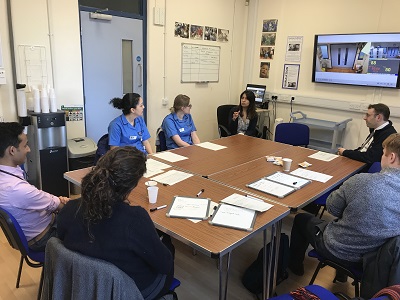Courses
In-suite simulation
From August 2019 – July 2020 we facilitated 1,372 people through simulation based activities or programmes run by WiSER faculty. 984 people were involved as participants with our in-suite programmes with 112 sessions running in our simulation suite based in Watford General Hospital’s Medical Education Centre.
WiSER faculty ran simulations for the following groups:
- COVID-19 Study Days and Simulations
- Foundation Year Doctors (1 & 2)
- Nursing Students
- UCL Medical Students
- SGU Medical Students
- Anaesthetics
- Royal College of Emergency Medicine Trainees
- Faculty Development Courses
- Applying Skills and Knowledge courses for senior nurses
- Core Medical Trainees – cardiac arrest simulations
- Preceptorship Simulation – Newly qualified staff
- Intensive Care Unit
- Maternity
-
Paediatrics
- Trainee Physician Associates
- Student Nurse Associates
- Theatres




When asked for feedback from the participants, they answered:
-
"I was one of the FiYs at Watford earlier this year: I have done a lot of on-calls now and I have been called to a lot of emergencies and I just wanted to say thanks for such good teaching. I felt so much better prepared than I would have been thanks to the amazing sim sessions we had throughout final year and FiY. It was really invaluable experience!"

- "I'm going to do as many simulations as I can, they're so useful!!"
- "The positive, constructive feedback sessions are very, very good."
- "I feel very happy to have received such thorough teaching. The environment was well equipped and the facilitators were very encouraging and supportive. It is a safe place to ask questions and practice skills."
- "It was really intense but after the debrief, it became more clear and easier to understand."
- "However nervous you are it is so important to practice in a safe environment!"
We find people tend to take away not only technical learning points such as equipment or assessment based practices, but non-technical skills such as communication and leadership skills. This is where simulation moves away from traditional skills based training and more experiential learning through recognisable scenarios.


